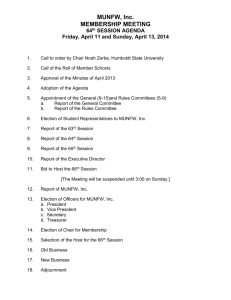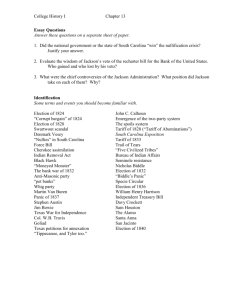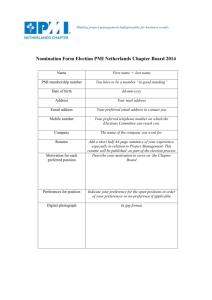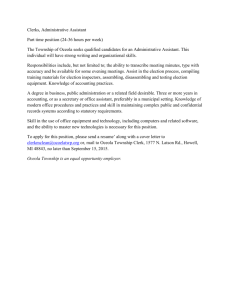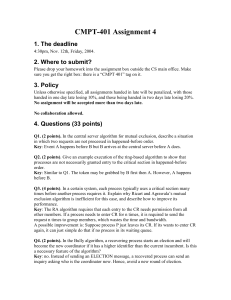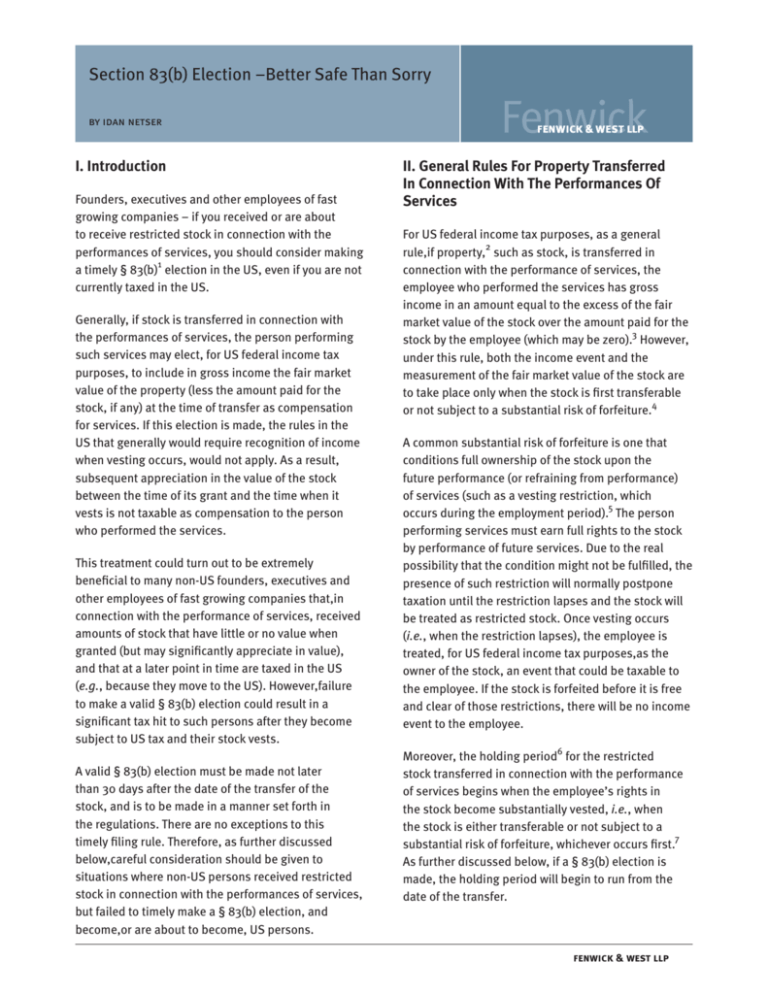
Section 83(b) Election –Better Safe Than Sorry
by idan netser
I. Introduction
Founders, executives and other employees of fast
growing companies – if you received or are about
to receive restricted stock in connection with the
performances of services, you should consider making
a timely § 83(b)1 election in the US, even if you are not
currently taxed in the US.
Generally, if stock is transferred in connection with
the performances of services, the person performing
such services may elect, for US federal income tax
purposes, to include in gross income the fair market
value of the property (less the amount paid for the
stock, if any) at the time of transfer as compensation
for services. If this election is made, the rules in the
US that generally would require recognition of income
when vesting occurs, would not apply. As a result,
subsequent appreciation in the value of the stock
between the time of its grant and the time when it
vests is not taxable as compensation to the person
who performed the services.
This treatment could turn out to be extremely
beneficial to many non-US founders, executives and
other employees of fast growing companies that,in
connection with the performance of services, received
amounts of stock that have little or no value when
granted (but may significantly appreciate in value),
and that at a later point in time are taxed in the US
(e.g., because they move to the US). However,failure
to make a valid § 83(b) election could result in a
significant tax hit to such persons after they become
subject to US tax and their stock vests.
A valid § 83(b) election must be made not later
than 30 days after the date of the transfer of the
stock, and is to be made in a manner set forth in
the regulations. There are no exceptions to this
timely filing rule. Therefore, as further discussed
below,careful consideration should be given to
situations where non-US persons received restricted
stock in connection with the performances of services,
but failed to timely make a § 83(b) election, and
become,or are about to become, US persons.
II. General Rules For Property Transferred
In Connection With The Performances Of
Services
For US federal income tax purposes, as a general
rule,if property,2 such as stock, is transferred in
connection with the performance of services, the
employee who performed the services has gross
income in an amount equal to the excess of the fair
market value of the stock over the amount paid for the
stock by the employee (which may be zero).3 However,
under this rule, both the income event and the
measurement of the fair market value of the stock are
to take place only when the stock is first transferable
or not subject to a substantial risk of forfeiture.4
A common substantial risk of forfeiture is one that
conditions full ownership of the stock upon the
future performance (or refraining from performance)
of services (such as a vesting restriction, which
occurs during the employment period).5 The person
performing services must earn full rights to the stock
by performance of future services. Due to the real
possibility that the condition might not be fulfilled, the
presence of such restriction will normally postpone
taxation until the restriction lapses and the stock will
be treated as restricted stock. Once vesting occurs
(i.e., when the restriction lapses), the employee is
treated, for US federal income tax purposes,as the
owner of the stock, an event that could be taxable to
the employee. If the stock is forfeited before it is free
and clear of those restrictions, there will be no income
event to the employee.
Moreover, the holding period6 for the restricted
stock transferred in connection with the performance
of services begins when the employee’s rights in
the stock become substantially vested, i.e., when
the stock is either transferable or not subject to a
substantial risk of forfeiture, whichever occurs first.7
As further discussed below, if a § 83(b) election is
made, the holding period will begin to run from the
date of the transfer.
fenwick & west llp
III. Section 83(b) Election
A. Overview Of US Federal Income Tax Consequences
Although stock transferred in connection with the
performance of services that is subject to forfeiture
and transferability restrictions is normally taxed to the
employee only when those restrictions lapse, § 83(b)
allows the employee to elect to accelerate the taxable
event to the time of the transfer itself. If the employee
makes this election, the compensation element in
the transaction is closed at the time of transfer and,
thereafter,the employee is treated as the owner of the
stock for US federal income tax purposes.
Why would the employee elect to include an amount of
compensation in income in a taxable year earlier than
the year otherwise required by the general rule under
§ 83(a)? Often such treatment is desirable where at the
time of the grant the stock has no or small fair market
value and is expected to appreciate significantly.
When vesting occurs (i.e.,when the restriction lapses),
if stock has appreciated in value, absent a § 83(b)
election, each vesting would be a taxable event to the
employee.
The primary effect of the § 83(b) election is to shift
the tax focus in a transfer of restricted stock from the
lapse of the restrictions to the transfer itself. The lapse
of restrictions, which normally triggers the taxable
event under § 83(a) , is no longer a taxable event if a §
83(b) election is made. Rather, compensation income
arises in the year of the transfer. There after, the
general rule under § 83(a) (discussed above) does not
apply to the stock, even when the restrictions lapse. At
issue is the compensation income that normally arises
between the transfer and the lapse of the restrictions
due to appreciation in the value of the stock. The §
83(b) election permits the employee to avoid taxation
on that appreciation when the restrictions lapse and
to pay tax on that appreciation only if and when the
employee disposes of the stock. Moreover, if the §
83(b) election is made, when the stock is disposed of,
the tax character of that appreciation changes from
compensation income under § 83(a) to capital gain.8
In addition, because the § 83(b) election closes the
compensation element in the transaction, once the
election is made the employee is treated, for US
federal income tax purposes, as the owner of the
stock. Thus, the employee’s holding period in the
2 section 83(b) election—better safe than sorry
stock begins to run “just after the date such property
is transferred.”9 And if the stock is treated as being
held for more than a year, the employee could be
eligible for the reduced capital gains rate.
The election under § 83(b) carries with it certain risks
to the employee. One of the risks that the employee
assumes in making the election is that the election,
once made, is irrevocable, unless the revocation
request is filed on or before the due date for making
the § 83(b) election10 or the Internal Revenue
Service (the “IRS”) consents to the revocation.11 The
regulations provide that the employee may revoke
the election if there was a mistake off act “as to
the underlying transaction” and if there quest for
revocation comes within 60 days of the date on which
the mistake of fact becomes known to the employee.12
A mistake as to the value of the stock, a decline in
value of the stock, or the failure to perform an act
contemplated at the time of the transfer does not
qualify as a mistake of fact.13
Another risk in the election arises since the election
is made while the stock is still subject to a substantial
risk of forfeiture. If the stock is later forfeited, no
deduction will be allowed for the amount included in
income as a result of the § 83(b) election in respect of
such forfeiture.14 However, the employee is allowed a
capital loss deduction if the amount paid for the stock
is not fully restored upon forfeiture.15
Essentially, the employee is given a choice to wait
until the forfeiture or non-transferability restrictions
lapse for the income event, or to incur an accelerated
income event, recognizing the possibility of
forfeiture,but seeking the substantial tax benefits
arising from the election. The cost extracted for those
significant benefits is that no deduction is allowed
for the amount included in income, if the stock is
forfeited.
B. Time And Manner Of Election
A valid § 83(b) election must be made not later than30
days after the date of the transfer of the stock,and
in a manner set forth in the Treasury regulations.16
There are no exceptions to this timely filing rule. The
last possible day for filing is calculated by counting
every day (including Saturdays, Sundays and holidays)
starting with the next day after the date on which
fenwick & west
the stock is purchased. For example,if the stock is
purchased on May 16, the last possible day for filing
is June 15. The official postmark date of mailing is
deemed to be the date of filing.
The election must be in writing and must generally be
filed within the above time limits at the IRS office at
which the employee regularly files their tax returns.17
A written statement (discussed immediately below)
must also be attached to the employee’s income tax
return for the year of the transfer.18 The employee
must send a copy of the election to the employer, and
in any situation in which the transferee of the stock
is not the employee, a copy of the statement must be
forwarded to the transferee.19
The written statement must indicate that it is being
made under § 83(b) and must be signed by the
employee. In addition, the statement must include the
following information:
(1) The taxpayer’s name and address, and a taxpayer
identification number (further discussed
immediately below);
(2) A description of the property which is the subject
of the election;
(3) The date of the transfer and the calendar year
involved;
(4) The nature of the restrictions attached to the stock;
(5) The fair market value of the stock (at the time of
the transfer);
(6) The amount paid (if any) for the stock; and
(7) A statement that copies of the election have been
filed with the employer and, if necessary,with the
transferee of the stock.20
The IRS has provided sample language that maybe
used, but is not required to be used, for making a §
83(b) election.21 See Revenue Procedure 2012-29 ,22
effective June 25, 2012. A § 83(b) election must contain
all the information required by the regulations, but
need not use the exact format or language of the
sample election.
3 section 83(b) election—better safe than sorry
A taxpayer identification number (“TIN”) is an
identification number used by the IRS in the
administration of tax laws. A TIN may include a
Social Security Number (“SSN”), issued by the Social
Security Administration,or an Individual Taxpayer
Identification Number (“ITIN”), issued by the IRS.23
Foreign taxpayers often do not have an SSN24 and
therefore should consider obtaining an ITIN before
making the § 83(b) election. An ITIN is a tax processing
number only available for certain nonresident and
resident aliens, their spouses,and dependents who
cannot obtain an SSN. It is a nine-digit number,
beginning with the number“9,” formatted like an
SSN (NNN-NN-NNNN). ITINs are issued regardless
of immigration status because both resident and
nonresident aliens may have a US filing or reporting
requirement under the Code. ITINs are for US federal
tax reporting only,and are not intended to serve any
other purpose. The IRS issues ITINs to help individuals
comply with the US tax laws, and to provide a means
to efficiently process and account for tax returns
and payments. IRS Form W-7, IRS Application for
Individual Taxpayer Identification Number is used
to obtain an ITIN. Form W-7 requires documentation
substantiating foreign/alien status and true identity
for each individual. Taxpayers that qualify for an ITIN
should receive a letter from the IRS assigning their
ITIN usually within six weeks after submitting the
application.25
It is not entirely clear whether an otherwise complete
§ 83(b) election that is missing a TIN will be respected
by the IRS. Nevertheless, taxpayers without an
ITIN that need to promptly make a § 83(b) election
(e.g.,because the 30-day period is about to expire)
should also submit an ITIN application and state in
the election that such application was made and is
pending.
C. If You Become A US Taxpayer But Did Not Properly
File A § 83(b) Election …
The United States has a worldwide taxation system
that generally subjects only “United States persons”
to tax on their worldwide income. The term “United
States person” is defined to include, among others,
any citizen or resident of the United States.26
Therefore, there generally should not be any US
tax consequences to a non-US person receiving
fenwick & west
restricted stock in connection with the performance of
services rendered outside the US,including when the
restrictions attached to such shares lapse (e.g., when
the shares vest). This rule apparently leads many nonUS persons to refrain from filing a § 83(b) election
with respect to stock received in connection with the
performances of services outside the US. And if any
such non-US person never becomes a US person, not
filing the election generally should not result in any
adverse US tax consequences.
However, any person while a resident of the United
States, regardless of such person’s nationality, will
generally be treated as a US person and will be subject
to US federal income tax on their worldwide income,
regardless of its source.27 As a result, in the absence
of a valid § 83(b) election, the lapse of the restrictions
attached to the stock, or a block of stock, received
in connection with the performances of services
(e.g., upon vesting) would be a taxable event to the
employee. Specifically, this means that when a non-US
person becomes a US person (which is likely to occur
when the person moves to the US), on each vesting
date that person will have ordinary income on the
spread between his original nominal purchase price
and the fair market value of the stock, at the time of
the vesting. This could mean substantial tax over time.
Unfortunately, as discussed above, there are generally
no exceptions to the timing for filing a valid §83(b)
election – the election must be made not later than
30 days after the date of the transfer of the stock.
No relief is available for taxpayers that did not file
the election within the 30-day period, even though
they were not US persons when receiving the shares
and only became US persons at a later point in time.
Unfortunately, we’ve seen this occur to founders and
executives of fast growing companies that started
operating outside the US and then moved into the US.
To avoid this issue, founders, executives and other
employees receiving restricted stock subject to vesting
should be advised to promptly file a § 83(b) election
in the US, in the manner discussed above and within
the 30-day period, even if they don’t know if and
when they will eventually move to the US.28 This may
also require applying to receive an ITIN, as discussed
above.
Careful consideration should be given to situations
where non-US persons received restricted stock in
connection with the performances of services, failed
to timely make a § 83(b) election, and become, or
are about to become, US persons. Such persons are
strongly advised to consult with their own tax advisors
with respect to the particular US federal income tax
consequences that would apply to them.
One possible solution to this issue may be to fully
accelerate the vesting of the restricted shares
before the employee moves to the US. If there are
no restrictions attached to the shares the employee
is treated as the owner of such shares for US federal
income tax purposes and § 83(a) should not apply.
In a later point in time, it might be possible to reimpose vesting on the shares.29 Another alternative
solution may be to subject the employee to alternative
restrictions such as a lock-up or no sale. However, if
the new or alternative restrictions are in substance
similar to the original vesting restrictions,there is
a greater risk that the transaction would be treated
by the IRS as a tax avoidance scheme and be
disregarded. Lastly, the unvested shares could be
cancelled with the employee instead being issued
options. This, however, may not be a popular approach
with founders for obvious reasons (e.g., since options
carry strike price, do not have voting rights or do not
have as favorable tax treatment as shares).
IV. Conclusion
Non-US founders, executives or other employees
receiving restricted stock in connection with the
performance of services should consider promptly
filing a § 83(b) election in the US, in a proper and a
timely manner, even if they do not know if and when
they will eventually move to the US.
Non-US persons who received restricted stock
in connection with the performances of services
and failed to properly or timely make a § 83(b)
election,and become, or are about to become, US
persons should consult with their own tax advisors
with respect to the particular US federal income tax
consequences that would apply to them.
IRS Circular 230 Disclaimer
To ensure compliance with requirements imposed
by the IRS, we inform you that any US federal tax
4 section 83(b) election—better safe than sorry
fenwick & west
advice in this article is not intended or written by
Fenwick & West LLP to be used, and cannot be used,
for the purpose of (i) avoiding penalties under the
Internal Revenue Code or (ii) promoting,marketing,
or recommending to another party any transaction or
matter addressed herein.
17 Treas. Reg. § 1.83-2(c) . If the employee is a resident outside
the US, the election should be filed to the following address:
Department of the Treasury, Internal Revenue Service Center,
Austin, TX 73301-0215, USA.
Endnotes
21 Rev. Proc. 2012-29 , 2012-28 I.R.B. 49, available at: http://www.
irs.gov/pub/irs-drop/rp-12-29.pdf . 222012-28 I.R.B. 49.
1 All section (§) references are to the Internal Revenue Code of
1986, as amended (the “Code”), and the Treasury regulations
(“Treas. Reg.”) promulgated thereunder.
23 Other available taxpayer identification numbers may include
Employer Identification Number (EIN) and Preparer Taxpayer
Identification Number (PTIN). An SSN is issued by the Social
Security Administration whereas all other TINs are issued by the
IRS.
2 “Property” for this purpose generally includes real and personal
property, but does not include either money or an unfunded and
unsecured promise to pay money or property in the future. Treas.
Reg. § 1.83-3(e) . For example, the grant of a stock appreciation
right (i.e., an unfunded and unsecured promise to transfer
money or property in the future) is not a transfer of “property”
for purposes of § 83 , but § 83 would apply to the receipt of
property upon the exercise of the stock appreciation right.
3 § 83(a) .
4 Id.
5 See Treas. Reg. § 1.83-3(c) (1). A forfeiture condition attached to
stock that requires the employer to pay to the employee upon
forfeiture the fair market value of the stock is not a substantial
risk of forfeiture for purposes of § 83 . A condition of this type
will, therefore, not delay the taxation of restricted stock beyond
the date of the transfer of the stock to the employee. Treas. Reg.
§ 1.83-3(c) (1). Note also that under § 83(c) (3), “(s)o long as the
sale of property at a profit could subject a person to suit under
§16(b) of the Securities Exchange Act of 1934, such person’s
rights in such property are – (A) subject to a substantial risk of
forfeiture, and (B) not transferable.”
6 The concept of holding period is a fundamental component
of the tax treatment of capital gains and losses. The Code
distinguishes between short-term and long-term gains and
losses. Long-term gains are generally taxed at lower rates than
are short-term gains or ordinary income. Under the current law,
an asset has a long-term holding period if it has been held, or is
deemed to have been held, for more than one year.
7 § 83(f) ; Treas. Reg. § 1.83-4(a) .
8 § 83(b) (1); Treas. Reg. § 1.83-2(a) .
9 Treas. Reg. § 1.83-4(a) . In addition, due to the employee’s status
as the owner of the stock (once the compensation portion of the
transaction closes), the employee will also be treated as the
owner of the income generated by the stock (e.g., dividends)
from the time of the § 83(b) election.
10 Rev. Proc. 2006-31 , 2006-2 C.B. 32, § 2.08 .
11 § 83(b) (2); Treas. Reg. § 1.83-2(f) . See Rev. Proc. 2006-31, Id.,
for the procedure to request IRS consent to the revocation of a §
83(b) election.
12 Treas. Reg. § 1.83-2(f) .
13 Id.
14 § 83(b) (1).
15 Treas. Reg. § 1.83-2(a) .
16 Treas. Reg. § 1.83-2(b) .
5 section 83(b) election—better safe than sorry
18 Id.
19 Treas. Reg. § 1.83-2(d) .
20 Treas. Reg. § 1.83-2(e) .
24 Form SS-5, Application for a Social Security Card is used to
apply for an SSN and requires evidence of identity, age, and US
citizenship or lawful alien status.
25 See IRS, General ITIN Information, available at: http:// www.irs.
gov/Individuals/General-ITIN-Information .
26 § 7701(a) (30). On the other hand, under § 871 , nonresident
alien individuals and other non-US persons are subject to
US federal income tax only on their income which is either (i)
effectively connected with the conduct of a trade or business
within the United States (“effectively connected income” or
“ECI”), or (ii) certain other US source income.
27 An alien individual is considered a US resident if the individual
is a lawful permanent resident under US immigration laws,
also known as a green card holder. An alien individual is also
considered a resident if the individual meets a “substantial
presence” test. See § 7701(b) (3). The substantial presence test
applies on a calendar year basis. An individual meets the test
for a given calendar year if the individual is physically present
in the United States for at least 31 days during the year and
the sum of the number of days the individual is present during
the current year and the two immediately preceding years is
at least 183 days (by using 1/3 as a multiplier for the number
of days in the preceding year, and 1/6 for days in the second
preceding year). Id. Thus, for example, an individual meets the
substantial presence test if he or she is present in the US for
122 days in the current year and was also present in the US for
122 days in each of the two preceding years, as follows: 122 +
1/3 (122) + 1/6 (122) = 183. However, notwithstanding the above
formula, an individual is not treated as meeting the substantial
presence test if he or she is physically present in the US on
fewer than 183 days during the current year and can establish a
closer connection to a foreign country in which he or she has a
“tax home” (generally, his or her principal place of business). §
7701(b) (3)(B) . In counting the number of days an individual is
present in the US for purposes of the substantial presence test,
a day must be counted as a full day of presence if the individual
is physically present in the US at any time during that day.
Certain days on which an individual is physically present in the
US are not counted for purposes of the substantial presence
test. For example, days on which the individual is a student,
trainee, or teacher are excluded from the day count. § 7701(b)
(5). Additionally, an individual who is a resident of a country with
which the US has an income tax treaty may be able to establish
that he or she is a resident of that country, and not the US, under
the “tie breaker” residency rules of the treaty. Additionally,
an alien individual can make a “first year election” under §
7701(b) (4) to be treated as a US resident for the calendar year
if he or she satisfies certain conditions. An individual who is a
US income tax resident for the current year but who was not a
resident at any time during the preceding year is treated as a
fenwick & west
resident only for the portion of the current year beginning on
the “residency starting date.” § 7701(b)(2)(A) . For an individual
treated as a resident under the substantial presence test, the
“residency starting date” is the first day of the year on which the
individual is present in the US. § 7701(b)(2)(A)(iii).
28 Indeed, having non-US persons filing § 83(b) elections could
result in a significant administrative burden to the IRS that may
have to deal with potentially a very large number of elections.
29 See generally, Rev. Rul. 2007-49 , 2007-31 I.R.B. 237
(7/30/2007), for the US federal income tax consequences under
§ 83 when restrictions are imposed on substantially vested
stock causing that stock to become substantially nonvested.
The ruling generally holds that if the imposition of such
restrictions occurs in the absence of an exchange of stock, the
substantially nonvested stock is not subject to § 83 . However,
if the substantially vested stock is exchanged for substantially
nonvested stock, the substantially nonvested stock is subject to
§ 83 .
6 section 83(b) election—better safe than sorry
For more information please contact:
Idan Netser, 650.335.7119; inetser@fenwick.com
Originally published in the Global Tax Weekly on May 22, 2014.
©2014 Fenwick & West LLP. All Rights Reserved.
the views expressed in this publication are solely those
of the author, and do not necessarily reflect the views
of fenwick & west llp or its clients. the content of the
publication (“content”) should not be regarded as
advertising, solicitation, legal advice or any other advice on
any particular matter. the publication of any content is not
intended to create and does not constitute an attorney-client
relationship between you and fenwick & west llp. you should
not act or refrain from acting on the basis of any content
included in the publication without seeking the appropriate
legal or professional advice on the particular facts and
circumstances at issue.
fenwick & west


